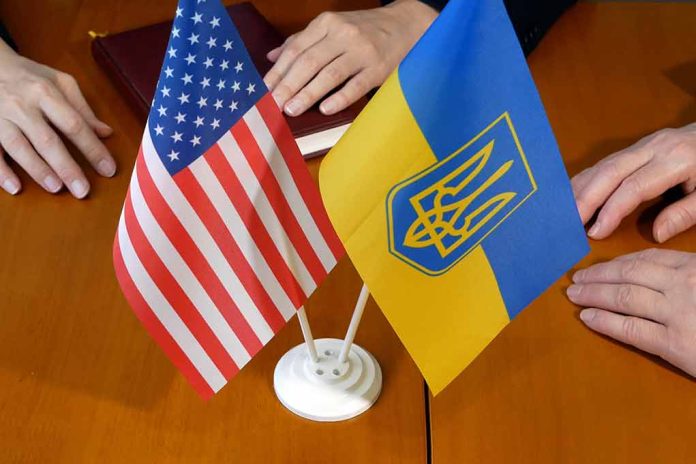
Ukrainian President Volodymyr Zelensky congratulates Donald Trump on his 2024 election victory, sparking discussions about the future of U.S.-Ukraine relations and peace efforts against Russia.
At a Glance
- Zelensky congratulated Trump on his “impressive election victory” and recalled their past meeting.
- Trump vowed to “stop wars” and claimed he could end the Ukraine conflict in 24 hours.
- Uncertainties loom over continued U.S. military and financial aid to Ukraine under Trump’s presidency.
- Zelensky emphasized the importance of continued bipartisan U.S. support for Ukraine.
- Ukrainian officials and citizens express mixed reactions to Trump’s potential return to office.
Zelensky’s Congratulations and Diplomatic Outreach
In a surprising turn of events, Ukrainian President Volodymyr Zelensky has extended his congratulations to Donald Trump following his victory in the 2024 U.S. presidential election. Zelensky’s message, shared on social media, recalled a previous meeting with Trump where they discussed the Ukraine-U.S. strategic partnership and Ukraine’s Victory Plan against Russian aggression.
Congratulations to @realDonaldTrump on his impressive election victory!
I recall our great meeting with President Trump back in September, when we discussed in detail the Ukraine-U.S. strategic partnership, the Victory Plan, and ways to put an end to Russian aggression against…
— Volodymyr Zelenskyy / Володимир Зеленський (@ZelenskyyUa) November 6, 2024
Zelensky’s diplomatic outreach comes at a critical time for Ukraine, as the country continues to defend itself against Russian invasion. The Ukrainian leader expressed appreciation for Trump’s “peace through strength” approach, hoping to implement this strategy to achieve peace in Ukraine.
“This is exactly the principle that can practically bring just peace in Ukraine closer. I am hopeful that we will put it into action together,” said Zelensky.
Trump’s Stance on the Ukraine Conflict
During his acceptance speech, Trump promised to put an end to ongoing wars, a commitment that has raised both hope and concern in Ukraine. The president-elect has claimed he could end the Ukraine war in 24 hours, a statement that has been met with skepticism from military experts and criticism from political figures, including former Vice President Mike Pence.
Trump’s approach to resolving the Ukraine conflict emphasizes diplomatic solutions over prolonged military involvement, aiming to protect American interests and avoid further escalation. He has proposed a negotiated settlement to end hostilities swiftly, prioritizing peace and stability, even if it means making concessions that Ukraine may not fully accept.
Uncertainties Surrounding U.S. Aid to Ukraine
One of the most pressing concerns for Ukraine is the future of U.S. military and financial aid under a Trump presidency. The United States has been a major contributor to Ukraine’s defense efforts, with Congress approving $175 billion in aid. However, Trump has previously opposed continued U.S. aid to Ukraine and criticized Zelensky for not negotiating an end to the conflict.
These uncertainties have led to concerns in Kyiv about the potential need to seek support from other Western allies. The prospect of a Trump victory is particularly worrying for Ukraine, as his party previously blocked aid to the country for over nine months.
Ukrainian Reactions and Adaptations
Ukrainians are reacting to Trump’s election with a mix of trepidation and resolve. While some express concern about Trump’s unpredictability and his relationship with Russian President Vladimir Putin, others see potential opportunities for Ukraine to adapt its approach to U.S. relations.
“I do not think that his presidency will be bad for Ukraine — maybe difficult, challenging, but not necessarily bad,” said Oleksandr Merezhko, head of the foreign relations committee in the Ukrainian parliament. He emphasized the need for Ukraine to adapt its approach and leverage Trump’s business-oriented mindset.
As the international community watches closely, the future of U.S.-Ukraine relations and the ongoing conflict with Russia hangs in the balance. The coming months will be crucial in determining whether the strategic partnership between the two nations can withstand the potential shifts in U.S. foreign policy under a new Trump administration.





